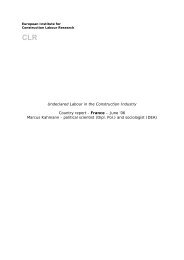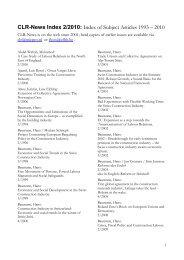Japan – what can we learn? - Construction Labour Research
Japan – what can we learn? - Construction Labour Research
Japan – what can we learn? - Construction Labour Research
You also want an ePaper? Increase the reach of your titles
YUMPU automatically turns print PDFs into web optimized ePapers that Google loves.
Union (DENKI RENGO), Confederation of <strong>Japan</strong> AutomobileWorkers' Unions (JIDOSHA SOREN), <strong>Japan</strong> Confederation ofShipbuilding and Engineering Workers' Unions (ZOSEN JUKIROREN) and some other industrial unions conduct joint consultationsat their industrial levels. Linking with enterprise-level consultations,the industrial joint consultation is expected to help expand the degreeof workers' participation. Fully developing and generalising industriallevel joint consultation beyond enterprise barriers is one of thestrategic tasks for the <strong>Japan</strong>ese union movement.2.3 Enterprise-based industrial relations and flexibility of internalmanagement market.The <strong>Japan</strong>ese enterprise-based unionism emerged and has developedas a system of organisation harmonious to the internal managementmarket. The idea of an internal management market is also integratedwith the long-term employment practice and skill formation by intrafirmtraining. But for enterprise-based unionism to contribute to thestability of management relations and to be able to functionharmoniously with the logic of the internal management market, thereis a definite precondition to be fulfilled by the enterprise: theenterprise must have a particular character.In the early post-war years, <strong>Japan</strong>ese management unions rosevaliantly for the abolition of status-based discrimination in thecompany and democratisation of management. They succeeded inachieving these goals in a relatively short period of time. Thusemerging as an effective countervailing po<strong>we</strong>r within the enterprise,the union, if not by design, contributed towards signifi<strong>can</strong>tlytransforming the character of the <strong>Japan</strong>ese enterprise. In theemployment practice established in this process, the enterprise isassumed to exist not just as a means of making profits, but as a kind ofsociety in itself where management is required to guarantee itsemployees jobs and fringe benefits and the employees in return areexpected to contribute to the prosperity of the company. Thisunderstanding has taken a sort of normative character. The implicitunderstanding that dismissal is the last thing to do even in recessionreflects the operation of this social norm. Not that this social norm hasbeen conjured up in a short period of time. It is a historical product ofa long and fierce struggle bet<strong>we</strong>en management and labour overdismissals, through which both sides finally <strong>learn</strong>ed that mutual trustCLR News No 2/200656









